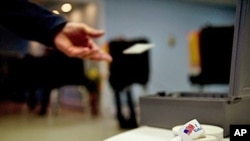Americans are voting in midterm elections that could determine the fate of President Barack Obama's legislative agenda for the next two years. Republicans are expected to make significant gains in the U.S. Congress.
At stake in nationwide balloting are all 435 seats in the House of Representatives, more than one-third of the Senate, and more than half of America's governorships.
President Obama had a simple election-eve message for voters: "You have got a chance to change your community and your country. All you have to do is vote."
After electoral cycles that saw Democrats win control of Congress in 2006 and the White House in 2008, Republicans are widely expected to reverse the tide this year.
Watch Laurel Bowman's Companion TV Report:
Public-opinion polls show Republicans favored among likely voters, many of whom say they are angry and frustrated over the sluggish U.S. economy, high unemployment, and America's soaring national debt.
Although Republicans could seize both houses of Congress, it is the House of Representatives where they are thought to have the best chance of taking control.
|
Sarah Williams' Q&A with Jim Malone on impact of Midterm election:
|
A party switch in the House would end the four-year tenure of Democratic Speaker Nancy Pelosi. Her likely replacement would be House Republican Leader John Boehner, who has pledged to reverse what he sees as the free-spending ways of the Obama administration.
"If we [Republicans] are lucky enough to be in the majority and I am lucky enough to be the Speaker of the House, it is going to be real different [in Congress]," said Boehner.
Indiana Republican Congressman Mike Pence told CBS' Early Show that Americans are demanding a change of course.
"People are scared," he said. "They look at a second year in a row of more than a trillion-dollar [federal] deficit, of government bailouts, and a government takeover of healthcare. And I do not think today is going to be about the American people saying they want Washington to get more done. I think there is a lot they want to get undone in Washington, D.C. A change in direction."
But a key Obama ally, Pennsylvania Governor Ed Rendell, said the president is not to blame for America's economic woes, and suggested that voters should not try to punish Democrats at the ballot box.
"I think expectations were unreasonably high for Barack Obama," said Rendell. "He took over the presidency facing the worst set of problems - not of his own making - that any American president has faced in the last 50 years. The problems were created by the failed policies of the previous eight years, and he [Obama] cannot turn them around automatically."
President Obama has scheduled a news conference for Wednesday, presumably to discuss the election results and how he plans to deal with a Congress that could have a radically-different composition beginning next year.
The last time Republicans took control of Congress was in 1994 - two years into the presidency of Bill Clinton. The next year saw a budget battle between the White House and Congress that produced a temporary shutdown of the federal government. But in subsequent years, President Clinton worked effectively with a Republican Congress on several major initiatives, including an overhaul of U.S. social welfare programs.
Republicans are pledging to halt President Obama's signature legislative accomplishment: a restructuring of America's private health insurance system. Some Republicans vying for congressional seats belong to the so-called "Tea Party" movement that sprung up after Mr. Obama entered office. As a group, Tea Partiers profess a determination to cut government spending, and have rejected the possibility of compromise on fiscal issues.




